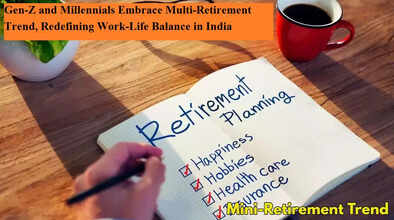Gen-Z and Millennials Embrace Multi-Retirement Trend, Redefining Work-Life Balance in India

For decades, retirement was seen as the final stage of one’s career — a permanent pause after years of work. But times are changing. A new concept called multi-retirement is gaining momentum, especially among young professionals in India. Unlike traditional retirement, this trend involves taking multiple short breaks, or “mini-retirements,” throughout one’s working life.
The shift reflects a change in how people view success, money, and happiness. According to the latest HSBC Quality of Life Survey, which covered 10,797 investors worldwide, including India, this evolving lifestyle preference is reshaping retirement planning across generations. The survey included individuals aged 21 to 69, highlighting how Gen-Z and millennials are driving this change.
What Exactly Is a Mini-Retirement?
A mini-retirement is a career break — lasting from a few months to a few years — that professionals plan intentionally. Unlike regular vacations, it allows individuals to pause their work life and focus on personal passions.
During this period, people often:
-
Travel and explore new places
-
Spend quality time with family
-
Pursue hobbies or creative interests
-
Enroll in courses to upskill or reskill
Interestingly, 85% of Indian respondents in the HSBC survey said mini-retirements improved their quality of life. They reported feeling more energized, inspired, and positive after returning to work.
Why the Multi-Retirement Culture Is Growing in India
The idea of multi-retirement — taking several mini-retirements during a career — is becoming increasingly attractive. It gives individuals freedom to prioritize personal happiness without waiting until their 60s to enjoy life.
-
48% of respondents expressed a desire to take at least one mini-retirement.
-
44% said their ideal break would last between 3 to 12 months.
This represents a dramatic departure from the traditional mindset of saving all leisure and personal fulfillment for post-retirement years.
Sandeep Batra, Head of International Wealth and Premier Banking at HSBC India, believes this signals a broader cultural shift. “Multi-retirement shows how people are rethinking the balance between career growth and personal satisfaction,” he explained.
Planning a Mini-Retirement: Financial Strategies Matter
Taking months off work doesn’t come without challenges. The survey found that 61% of people plan to spend $100,000 or more on each mini-retirement. To fund these breaks, individuals rely on:
-
Family or parental financial support
-
Part-time or freelance work
-
Personal savings and investments
Among younger Indians, Gen-Z and millennials stand out. Roughly 64% of Gen-Z respondents and 58% of millennials expressed interest in taking mini-retirements.
However, experts warn that financial planning is crucial. Batra emphasized the importance of an aggressive investment strategy tailored to long-term security. Without careful saving and investment, frequent breaks could strain future retirement plans.
Redefining Retirement for the Next Generation
The rise of multi-retirement marks a cultural and generational shift. For older generations, retirement was a one-time event marking the end of work life. For today’s youth, it’s about flexibility, balance, and self-discovery.
This shift also reflects changing values:
-
Work is no longer the sole measure of success.
-
Life experiences are prioritized as much as financial stability.
-
Younger generations seek balance, not burnout.
By embracing mini-retirements, professionals aim to avoid the regret of postponing joy until old age. Instead, they weave moments of rest, exploration, and fulfillment into their working years.
Final Takeaway
The multi-retirement trend signals a new era of work-life culture in India. As Gen-Z and millennials challenge traditional notions of retirement, they’re building lives that blend productivity with purpose. While financial discipline and strategic investments are key, the rewards — improved well-being, stronger relationships, and richer life experiences — make the effort worthwhile.
As more Indians embrace this lifestyle, retirement is no longer just an end. It’s becoming a recurring chapter in the evolving story of modern careers.

